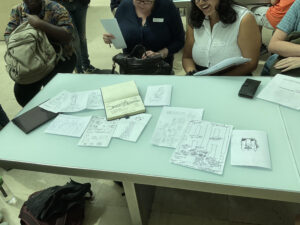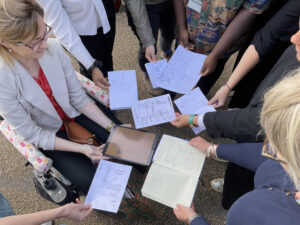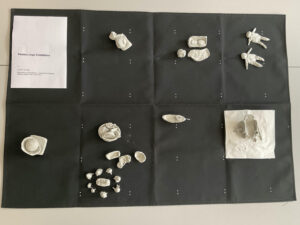The Fantasy Legal Exhibitions Workshop was a two day hands-on event co-organised by Victoria Barnes and Amanda Perry-Kessaris, and co-funded by the SLSA and Kent Law School.
The aim of the event was to explore exhibition as an actual-potential legal research practice. We chose the word ‘fantasy’ for two reasons. First, we wanted to signal that we hoped to push participants to think beyond what might initially appear possible—to work, at least provisionally, beyond everyday constraints of resources and our imagination. Second, we wanted to draw attention to the potential of exhibitions to conjure things—timelines, conjunctions, intersections, experiences—that are not accessible in the wider world, and that might prove generative for legal research(ers).
We planned the event with reference to the techniques and knowledge from experience design. For example, we paid close attention to the emotional, intellectual and behavioural dimensions of the participant experience before, during and after the core event. We used ‘briefs’—a series of carefully specified tasks—not only for the instrumental purpose of encouraging participants to make progress towards their fantasy exhibition, but also as a device to generate a coherent narrative for the event.
Before
The first brief was embedded in an atypical Call for Participation. Applicants were invited to respond to three prompts which were designed to surface something of their experiences and ambitions around exhibition:
- Describe how a particular exhibition or exhibited artefact has impacted upon how you think about law, or legal research, broadly construed.
- Identify one legal concept, actor, event or relationship to which you could draw attention through a ‘fantasy’ exhibition of real and/or imaginary artefacts.
- Describe one visitor that might come to your Fantasy Legal Exhibition, and how they would differ from those who might read your scholarly publications.
Once selected, participants were asked to complete a set of pre-event activities—a virtual tour of items, identifying a curated item that they would like to handle, and reading literature on curation, archiving, visual culture and design.
During
The core Workshop was held across five central London locations (British Museum, Postal Museum, Spa Fields Playground, Middle Temple, and the Institute of Advanced Legal Studies) on July 18 and 19 of 2023.
In each location, participants were invited to engage with artefacts, spaces, concepts, curatorial and archival practices, and/or experts, through the device of one or more briefs.
For example, participants were asked to choose one room of the crowded British Museum on which to focus as an ‘exhibition’, and to explore it spatially using mapping and photography; to draw one artefact from the room and caption it for a lay visitor, a legal practitioner and a legal academic; and then to consider to what the exhibition was drawing attention, as well as to what might be missing or erased, uncomfortable or unclear.

Sharing outcomes in the Great Court of the British Museum. Credit: Amanda Perry-Kessaris and Victoria Barnes 2023.
By contrast, outside among the shrubs and trees of Spa Fields Playground, participants were asked to focus on one piece of play equipment and to consider how they might adapt it to create an interactive or experiential component in their Fantasy Legal Exhibition.

Spa Fields Playground. Credit: Amanda Perry-Kessaris and Victoria Barnes, 2023.
Finally, in the calm of the Institute of Advanced Legal Studies (IALS), participants identified an item that it would be desirable, but impossible to include in their Fantasy Legal Exhibition—because, for example, it never existed, or no longer exists; then made a clay model of it to exhibit alongside those of other participants. And they mapped the journey, and accompanying sensations, emotions, and insights, that they anticipate for visitors to their Fantasy Legal Exhibition.

Exhibiting fantasy objects at the Institute of Advanced Legal Studies. Credit: Amanda Perry-Kessaris and Victoria Barnes, 2023.
After
Participants have thus far completed two post-Workshop briefs.
First, a statement reflecting on the Workshop experience, including insights gained, enjoyments had, and agonies sustained.
Second, a prototype of their Fantasy Legal Exhibition in the form of five slides with accompanying narration notes.
They have also provided feedback to each other.
An online presentation of the prototypes will be held in December 2023, and final versions of will be published in due course, along with the briefs and additional audio visual material, on the Fantasy Legal Exhibitions website.
So what?
Our hope was that participants would be prompted and facilitated to consider exhibition as part of the wider social, political, economic and cultural context of collection and curation; how they might ‘exhibit’ their legal research; and how in so doing they might enhance the quality of their research, as well as its potential impact, within within academia and beyond.
Their reflections suggest that all this and more has come to pass. For example:
‘I found during the workshop that being unseriously-serious, is very productive for envisioning real possibilities. I find there is huge critical potential in that.’ Renske Vos
‘We were constantly encouraged to explain our research concepts and exhibition ideas to (legally) informed but also unfamiliar audiences. This was a good entry point into thinking more deliberately and proactively about the notion of the research ‘audience,’ and then ‘visitor’, a term that I came to love during the workshop.’ Lilian Moncrieff
‘The exercises encouraged me to think about how to use my research to intrigue, engage and surprise.’ Helen Rutherford
‘[T]he reading and workshop confirmed that, as with many things in life, experts exist for a reason, and that putting on an exhibition in real life is no small undertaking’ Clare Williams
‘From mapping exhibits in the British Museum to paying attention to the layout of the Spa Fields playground, I am more aware about what is shown, where it is shown and why it is shown in that place…Thinking about the exhibition’s space has been a beneficial exercise in understanding my research’s relationship to the society in which it exists.’ Almas Shaikh
‘I moved from considering an exhibition as simply a method of accessing the actual research output to considering it a fundamental part of the project in and of itself.’ Fred Motson
‘Perhaps there is something to learn from archivists and curators about how law should be presented. Not as an icon to be frozen away and fiercely guarded but not common and open to multiple, conflicting interpretations either.’ Favour Borokini
‘As we reflect on those two days in early summer, what we remember is not so much the substance of our conversations (we don’t need to, we can find this in our notes) but the feeling of the beginnings of imaginative community, a community that explores the opportunities of fantasy, that encourages asking ‘what if …’ or ‘why not?’.’ Erika Rackley and Sharon Thompson
Acknowledgments
It is a near certainty that in the course of this event we have come into contact with ‘artefacts’ that were not, for whatever reason, freely given up by their rightful owners.
This event would not have been possible without the generous engagement of Susannah Coster, Archivist at The Postal Museum, and Barnaby Bryan, Archivist at Middle Temple.
Find out more at the Fantasy Legal Exhibitions website.

Leave A Comment